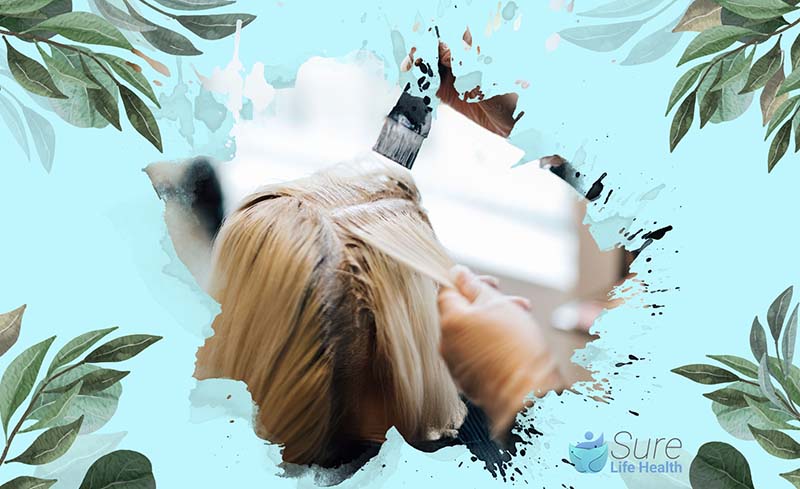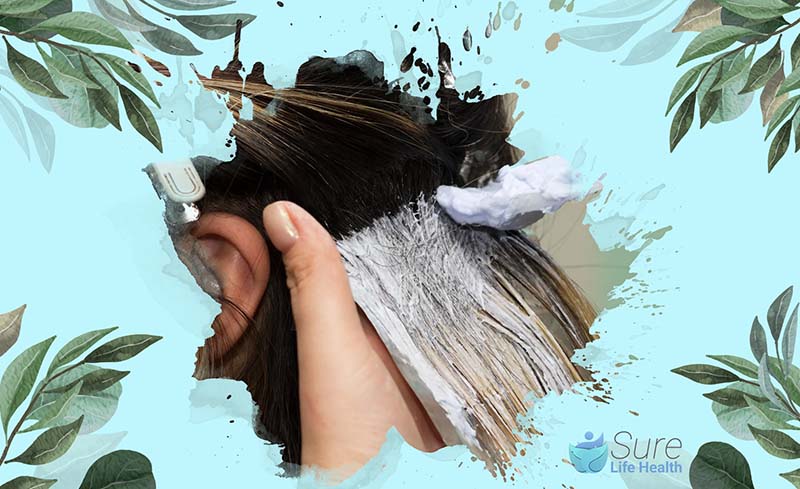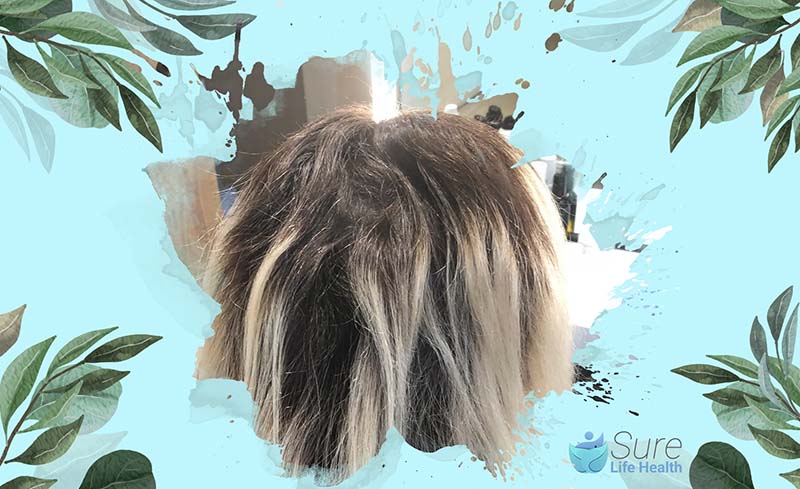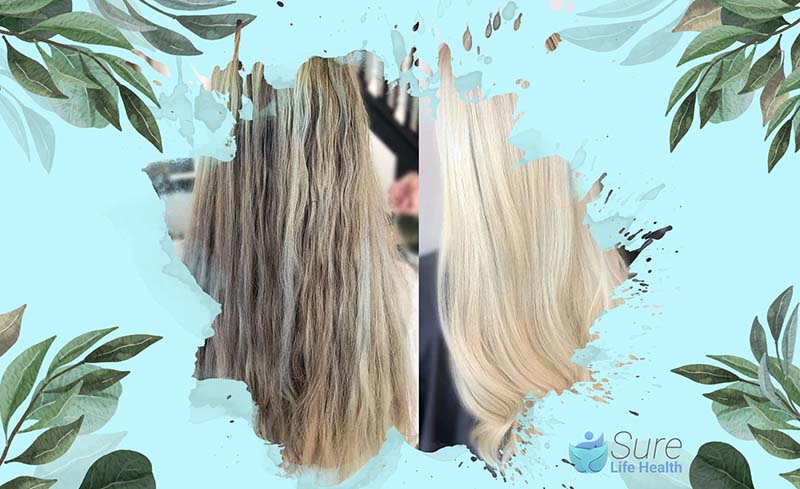Did you know that blonde is the most popular hair dye choice among Britons? Specifically, the cool tones of platinum, icy blonde are in vogue. However, achieving this coveted bleached blonde look can be quite challenging.
Bleaching your hair really tests its limits, and without the right care, it might not turn out as expected. Many issues with lightening hair occur during at-home experiments, which is why it’s best left to the professionals. They have the expertise to bleach your hair effectively while maintaining its health and integrity.
For those wondering “Does bleaching hair cause hair loss?” our expert guide unlock this concern and offers a comprehensive understanding of bleached hair coloring. Check it out to learn more.
Does Bleaching Hair Cause Hair Loss?
So, does bleaching hair cause hair loss? The answer is, potentially.
Hair loss can indeed be a risk associated with bleaching, although it’s not a direct result. Bleaching can make your hair dry, brittle, and less elastic—conditions that can lead to increased hair breakage and split ends. As your hair becomes more damaged, you might notice more hair loss. Additionally, bleached hair often becomes porous, making it more susceptible to damage from styling tools like blow dryers and curlers.
It’s important to understand that while bleaching itself doesn’t directly cause hair loss, it does make it more likely to occur. Routine actions such as brushing or sleeping can lead to more breakage as the hair weakens. Sometimes, breakage near the roots can leave visible stubble, which might be mistaken for more serious hair loss. While bleaching and highlighting can damage hair, they don’t typically cause hair to fall out from the roots.
However, it is crucial to consider that improper bleaching techniques can lead to more severe issues. For example, leaving bleach on your hair too long or using a poorly mixed product can damage your scalp and potentially lead to significant hair loss.

Reasonable Frequency of Hair Bleaching
When it comes to bleaching your hair, it’s crucial to strike a balance between achieving your desired look and maintaining the health of your hair. Ideally, limit bleaching sessions to once every three to eight weeks.
For all-over bleaching, it’s recommended to wait until your new growth reaches around ½ inch before applying bleach. By focusing only on the new growth, you minimize damage to already processed hair.
If you opt for highlights using foil or techniques like balayage, extend the time between sessions to six to eight weeks, or until your new growth reaches about 1 inch. This prevents overlap and helps preserve the overall health of your hair.
Waiting between sessions allows your hair and scalp to recuperate. Natural oils have time to moisturize both your scalp and hair, promoting better overall hair health.
Note: Regular deep conditioning treatments can help nourish and strengthen bleached hair, reducing the risk of damage. Additionally, consider using hair products specifically designed for color-treated or bleached hair to maintain its vibrancy and health between sessions.

How Does Bleaching Affect Hair?
Bleaching works by oxidizing the pigment in your hair shaft, essentially stripping it away to achieve a lighter shade. This process is essential for lightening hair and cannot be achieved without the use of a bleaching or oxidizing agent.
Hydrogen peroxide and ammonia are the primary bleaching agents used in hair products. Often, they are combined because when used individually, they are less effective and slower in lightening the hair. Be cautious of products labeled as “peroxide-free,” as they may still contain other oxidizing agents that can be equally damaging to your hair.
Note: It’s important to be mindful of the potential damage caused by bleaching agents. To minimize harm, consider using products with lower concentrations of these chemicals and follow up with deep conditioning treatments to replenish moisture and strengthen your hair.
Signs of Hair Damage Due to Hair Bleaching
Common indicators of hair damage from bleaching include:
- Dullness and a lack of shine
- Brittle strands prone to breakage
- Flyaways and split ends
- Excessive tangling that’s difficult to manage
- Dry, rough texture
In rare cases, severe bleach damage can lead to hair breakage or even hair loss. However, this typically occurs due to improper bleaching practices, such as excessive bleaching in a single session or treating fragile hair too aggressively.
It’s crucial to heed the advice of your colorist to prevent over-processing. Trust their expertise and recommendations, as they have your hair’s best interests in mind.
Note:
To mitigate the risk of hair damage from bleaching, ensure you’re working with a skilled colorist who understands how to balance achieving your desired look with maintaining the health of your hair.
Additionally, invest in quality hair care products specifically formulated for damaged or bleached hair to help restore moisture and strength.

How to Care For Hair After Bleaching
To keep your hair healthy after bleaching, it’s important to use products that help repair potential damage. Here are some key steps to follow:
- Preparation: Before bleaching, treat your hair with a pre-shampoo and conditioning regimen at least three days in advance.
- Post-Bleaching Care: After bleaching, use a deep conditioning treatment once a week. This helps restore moisture, improve elasticity, reduce breakage, and add shine and manageability.
- Daily Protection: Use a daily damage defense product before going out. These products protect your hair from UV rays and other environmental stressors like pollution, air conditioning, and wind.
- Gentle Hair Care: Be gentle with your hair to avoid breakage. Avoid rough brushing and tight hairstyles. Use lower heat settings on styling tools and consider using a Hair Thickening Serum to protect against heat damage.
- Caution: If you’re thinking about bleaching your hair, proceed with care and make sure to protect it properly. Focus on gentleness, hydration, and watch for signs of damage. If you notice excessive hair loss, take a break from coloring and highlighting for a few months to let your hair recover.
By following these tips, you can help maintain the health and beauty of your bleached hair.

FAQs
Can You Bleach Your Hair Twice in One Day
No, it’s not recommended to bleach your hair twice in one day. Bleaching is harsh on your hair and can lead to problems like breakage and thinning.
It’s best to give your hair time to recover between bleaching sessions.
Is It Normal to Lose Hair After Bleaching?
Yes, it’s normal to experience hair loss after bleaching. Bleaching breaks down the bonds in your hair, leading to hair loss.
On average, a person can lose up to 100-150 hair strands per day, especially after chemical treatments like bleaching.
Is It Safe to Bleach Your Hair While Pregnant
Bleaching your hair during pregnancy is considered safe, similar to using hair dye. However, it’s advisable to wait until after the first trimester.
Additionally, it’s recommended to avoid direct application of the bleach to the scalp, as pregnancy can make the skin more sensitive to new ingredients, potentially causing irritation.
Conclusion
In conclusion, the question “Does bleaching hair cause hair loss?” may raise concerns, but our discussion has shown that this issue is multi-faceted. With the right knowledge, you can confidently bleach your hair while minimizing potential risks and focusing on maintaining healthy hair.
However, our exploration doesn’t stop here. We encourage you to share your own experiences and insights about hair coloring, which will enrich our community with diverse perspectives.
And remember, for more insightful articles on hair care and more, be sure to visit SurelifeHealth. Let’s continue to care for our hair and celebrate our unique styles, one vibrant shade at a time.
Professor Gaye Cunnane, PhD, MB, FRCPI
As the Director of Health and Wellbeing at RCPI, Professor Gaye Cunnane is at the helm of initiatives aimed at enhancing the health and well-being of RCPI Trainers and Trainees. Her role extends beyond administration; she is also a respected clinical professor of rheumatology and a consultant rheumatologist at Trinity College Dublin (TCD) and St James’s Hospital. Prof. Cunnane’s medical journey began at TCD, where she graduated from medical school, and her path has been marked by both clinical and academic excellence.
After completing her basic clinical training in medicine, she embarked on PhD studies at University College Dublin and St Vincent’s University Hospital. Her research during this period was focused on prognostic markers in early inflammatory arthritis, a project that saw her collaborating with esteemed universities across Europe, including in Switzerland, The Netherlands, the UK, and Sweden.
Prof. Cunnane’s career took her to the University of California, San Francisco, where she spent three years delving into research on new treatments for lupus. Her academic prowess led her to the University of Leeds in 2001 as a senior lecturer, before returning to Ireland in 2003 to assume her current roles. She has also served as the National Specialty Director for Rheumatology training in Ireland, Programme Director for Basic Specialist Training with RCPI, and as a past President of the Irish Society for Rheumatology.
PUBLISHED ARTICLES
“Rheumatic disease differentiation using immunoglobulin G sugar printing by high-density electrophoresis”: Published in The Journal of Rheumatology, this study reflects her in-depth investigation into rheumatic diseases.
“Benefits of exercise in patients with rheumatoid arthritis: a randomized controlled trial”: This research work, highlighting the positive impact of exercise on rheumatoid arthritis, underscores Prof. Cunnane’s dedication to practical, patient-centered research.
Additionally, Prof. Cunnane has made notable contributions to the Annals of the Rheumatic Diseases, discussing early referral, diagnosis, and treatment of rheumatoid arthritis. She has also been involved in a study on the NCBI platform investigating exercise benefits in rheumatoid arthritis patients.
Professor Gaye Cunnane’s career is a testament to her commitment to improving patient outcomes in rheumatology through rigorous research, clinical excellence, and dedicated teaching. Her work continues to influence the field of rheumatology, both in Ireland and internationally.

